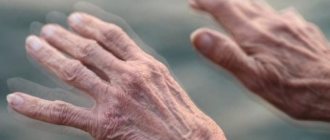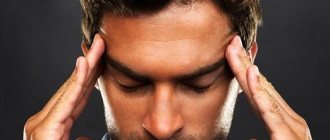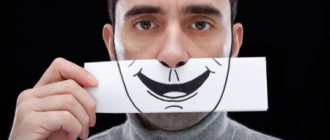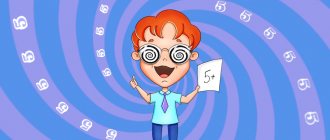Everyone's memory fails them from time to time. For example, how many times have you forgotten something you needed at home or couldn’t remember the name of someone you recently met?
A decrease in memory and other cognitive indicators can occur for natural reasons and be temporary - for example, due to overwork. Few people complain of forgetfulness since childhood, but the brain, like other structures of the body, inevitably changes with age. Unfortunately, it is not always possible to see in time the line between when absent-mindedness or age-related memory deterioration remains within the normal range, and when it develops into a pathological state. You should not experience any significant difficulties in your daily activities, and your quality of work and life should not suffer. When this happens, you should contact a specialist to determine the diagnosis. Even if memory problems are caused by a disease, with proper treatment they can be reversible.
Memory is one of the most complex structures of the psyche. Its violation entails a disorder in the abilities of cognition, the ability to reason, remember, make decisions and communicate. Memory problems go beyond normal if you notice the following signs:
- not only little things are forgotten, but also important events;
- it is impossible to concentrate, the thread of conversations is lost, the head is poorly thought out, it is difficult to grasp the plots of books or films, the same questions are asked many times;
- inability to make decisions, plan things, or learn instructions;
- it has become more difficult to navigate familiar environments and perform familiar tasks;
- the functions of speech and writing are disrupted: words are confused, syllables are swapped, the ability to express thoughts deteriorates;
- weak memory and changes in behavior become noticeable to those around you;
- the chronology of events is confused or false memories appear;
- Memory deterioration becomes more noticeable over time.
Diseases that include memory pathology usually begin unnoticed, but progress over time and deprive a person of the ability to work, communicate, and even take care of himself. Therefore, if your memory has noticeably deteriorated, do not delay visiting a doctor, because this may be the first sign of a serious neurological or mental illness. The sooner treatment is prescribed, the more successfully it will be possible to restore lost functions.
What to do if an elderly person loses memory
One of the common problems of older people is increased forgetfulness. This pathology occurs in 10–15% of people over the age of 65 and entails partial or complete loss of acquired skills, as well as absent-minded attention. This condition should not be underestimated, since Alzheimer’s disease is often behind memory loss.
At the first signs of memory loss, timely diagnosis and treatment are required to help restore brain activity. Examination of a person with memory loss includes:
- biochemical and general blood and urine tests;
- Doppler ultrasound;
- EEG is a research method that allows you to determine even the slightest changes in the function of the cerebral cortex;
- CT – layer-by-layer examination of the brain without contrast enhancement;
- TCD is a scan of brain vessels that allows you to detect pathologies in the early stages of development.
After diagnosis, the doctor prescribes medications aimed at improving brain activity.
Important! Memory loss is a condition that requires the help of a qualified specialist, since self-medication entails irreversible consequences.
Long-term stress
If exposure to cortisol is too long, then some of the receptors and neurons in the hippocampus can no longer cope with the influx of the stress hormone and atrophy, and the size of the hippocampus decreases. This can lead to memory impairment and cause learning problems. At the same time, cortisol also affects the amygdala, which plays a key role in the formation of emotions. Because of this, we get the typical symptoms of stress: irritability and increased anxiety.
Long-term bombardment of neurons with cortisol leads to the fact that the formation of connections between neurons, and therefore the memories themselves, becomes more difficult. Moreover, the stress hormone is capable of destroying existing connections, thereby activating the forgetting mechanism, so memory loss under stress is a very real consequence. In addition, the stress hormone prevents the brain from filtering connections and getting rid of unnecessary ones, which creates chaos and also makes it difficult to access important information.
If the brain continues to receive danger signals, it stimulates the adrenal glands to work too hard, causing the hormonal system to lose its ability to control stress levels. This means that until the stressful state decreases or passes, there is no one to protect the parts of the brain responsible for memory.
But that's not all. The effects of cortisol reduce the size of the prefrontal cortex of the brain, making it difficult for us to concentrate and make decisions. This is what can cause severe forgetfulness, when we cannot find the keys or do not remember that we made an appointment, and not at all due to natural absent-mindedness. Long-term stress can become one of the causes of the development of dementia (degradation of memory and thinking), as well as chronic depression.
Main types of memory disorders in old age
Memory disorder in older people is divided into several types:
According to the volume of forgotten information:
- selective amnesia;
- global amnesia.
According to the rate of memory loss:
- sudden;
- gradual.
According to the ratio of events of the present to the past:
- retrograde;
- anterograde.
By amount of time elapsed:
- long-term memory;
- short-term memory.
In addition, older adults may experience visual memory loss. In this state, a person does not recognize people he previously knew, including those closest to him.
Types and signs of amnesia
The main signs of amnesia:
- Memory problems: inability to learn new things, remember the past, and so on.
- Disorientation and confusion.
- Difficulties in communication and in performing mental work due to impairments in the assimilation and reproduction of information. This may give the impression of intellectual decline.
- Confabulations are false memories.
Most patients have problems with short-term memory - they cannot remember new information. At the same time, memories of current events are not stored in memory, while events of the past are preserved. A person can recount in detail incidents from childhood or know the names of former presidents, but will not remember what he ate for breakfast or what they talked about half an hour ago. Amnestic amnesia is different from dementia. In dementia, in addition to memory loss, serious cognitive impairment is observed.
Depending on the type of amnesia, its features differ. There are many types of memory loss. Here are the main types of amnesia:
- Retrograde amnesia is a violation of long-term memory when events that occurred before the onset of the painful condition are lost from it.
- Anterograde amnesia - events that occurred after the painful state are lost from memory.
- Anterograde - a combination of retrograde and anterograde amnesia.
- Fixation amnesia is the loss of the ability to remember current events.
- Progressive: Memory loss begins with later events, but gradually spreads to earlier ones.
- Dissociative amnesia: data about personal life events and biographical facts are lost, but general knowledge is preserved. This is mental amnesia that develops as a result of psychological trauma. An option is selective amnesia, when events about a limited period during which the traumatic situation usually occurred are erased from memory.
- Dissociative fugue: a severe generalized version of dissociative amnesia, in which for several days or hours the idea of one’s own personality is completely lost, even to the point of imagining oneself as another person. Sudden, targeted escapes and journeys are made.
- Korsakov's syndrome (amnestic syndrome): fixation amnesia of the head combined with disorientation (in space and time) and pseudo-reminiscences - movements of memories in time. Retrograde and anterograde amnesia may occur.
Degrees of amnesia vary greatly in severity and extent. In some cases, a person may seem completely healthy from the outside, but sometimes he completely loses the ability to self-care. Even mild amnesia affects daily activities, quality of life and prospects. The main danger is that it is impossible to predict whether this condition will recede or worsen. Therefore, it is important to contact a specialist in time for examination and observation: with the right approach, complete or partial restoration of the lost function is possible.
Symptoms of memory loss
Memory disorder is a gradual and long-term process, so it is quite difficult to notice any changes at the initial stage. The following symptoms are typical for this condition:
- frequent headaches caused by brain injuries;
- dizziness associated with dysfunction of the vestibular apparatus;
- tremor that worsens even with a minor stressful situation;
- impaired coordination of movements;
- absent-minded attention, inability to evaluate events or situations;
- chronic fatigue caused by past diseases (infectious, viral);
- apathy, depression;
- confusion - decreased concentration;
- speech disorders – inability to express thoughts, find the right words, speech dysfunction.
If memory loss is accompanied by these symptoms, the elderly person needs care, as the risk of getting lost on the street increases.
Effective Tips to Improve Memory
To avoid unpleasant symptoms, it is important to monitor your health and take preventive measures. It is very important to control your weight, as obesity directly affects brain function and memory.
Therefore, it is recommended to create a balanced diet and use gentle methods of weight loss. Short-term amnesia can occur anywhere and at any time. To refresh your memory in a short period of time, you can try taking a few deep breaths. Such actions put thoughts in order, relax the body and enrich the brain with oxygen, as a result of which the necessary information is “found”. If there is a heavy workload during the day, it is recommended to draw up a rough action plan in writing, which will allow you to remember to pay payments or attend any events. In addition, such records are better stored in the head for a long time. For the same purpose, notes in notebooks help pupils and students remember the answer to the question posed. Mentally imagine the pages of the lecture, and the material will be easier to remember. Help for young parents: start developing memory from a young age in a playful way, so as not to have to deal with treatment in the future. As a result, the child will do what he loves and at the same time improve brain function. Useful activities include putting together puzzles, playing scrabble, finding objects in a room, selecting rhymes, making associative series, etc.
More information in the article about how to improve memory and attention in adults
Short-term memory loss
One of the reasons for memory deterioration is the deterioration of the central nervous system (CNS). The process of renewal and formation of nerve cells is affected by slow metabolism, which often leads to short-term memory loss. In addition, sudden memory loss can be caused by other physiological and psychological reasons.
Physiological reasons:
- excessive mental stress;
- chronic malaise associated with the presence of various diseases;
- bruises, blows to the head;
- psychoneurological pathologies;
- cerebrovascular accident;
- Alzheimer's and Parkinson's disease;
- prolonged intoxication of the body;
- lack of physical activity;
- slow metabolism;
- lack of adequate regular nutrition;
- infectious diseases in active form.
Psychological reasons:
- depression;
- prolonged nervous tension;
- lack of proper rest, resulting in overexcitement;
- prolonged loneliness, lack of communication with loved ones.
Often the cause of memory impairment in old age is due to previous diseases (stroke, ischemia and their complications) and alcohol addiction.
Lack of medical attention for short-term memory loss can lead to brain dysfunction, so such patients need to be examined by a specialist.
What it is
Temporary memory loss is called transient (or transient) global amnesia. Usually occurs unexpectedly. This even throws some people into panic. Agree, it is difficult to come to terms with the fact that a young, healthy man in a leadership position completely forgets about a serious report or event that everyone in his company knows and remembers. It’s even worse when you find yourself in complete prostration, you don’t understand where you are and who you are. “Lost” elements can be different: from a name and residential address to small events (meeting, conversation, acquaintance).
This kind of memory loss is called short-term because it lasts for a short period of time. For example, after waking up, you can freeze in prostration for a few seconds. But, as a rule, after looking around, a person quickly comes to his senses, realizes that he is at home, and calms down.
Sometimes memory loss occurs for a few minutes: we forget why we came to the store (to a neighbor, just to another room). Having concentrated, we return everything to normal and remember what exactly we need to buy, ask or take.
In rare cases, it can last several hours. To restore it, you usually have to talk to other eyewitnesses of forgotten events, who help recreate their course, or play some recordings. Sometimes she revives on her own.
The frequency of short-term memory loss is also unpredictable. Some people experience this only once in their entire life. Some - several times a year. But there are those who suffer from such failures much more often. No specialist can tell you with 100% certainty whether this can happen again in a particular case.
Short-term memory loss should not be treated as an accident. Most often, it either becomes the result of serious disorders in the psyche or brain structures, or itself causes irreversible consequences in them.
Treatment
Memory loss is rarely due to just one cause. As a rule, brain dysfunction is a consequence of a malfunction in the functioning of the entire body. Therefore, treatment includes not only taking medications, but also various health measures:
- annual medical examination;
- regular blood pressure monitoring;
- refusal of excessive alcohol consumption, smoking;
- balanced diet;
- taking vitamin and mineral complexes;
- sleep at least 7 hours a night.
- development of intelligence (solving crossword puzzles, learning foreign languages, reading, etc.);
- regular physical activity (physical activity).
If memory impairment progresses, it is recommended:
- diversify your leisure time with drawing or singing lessons;
- activate brain activity (discuss with an elderly person his biography, life events, etc.);
- record events in a diary;
- discuss watching a movie, an event, a book read;
- take daily walks.
For a person with memory loss, it is very important to regularly maintain mental activity. Systematic physical activity, interesting leisure and communication will reduce the symptoms of memory impairment and have a beneficial effect on the general condition of an elderly person.
Short-term stress
Suppose you find out that you need to finish the work not in two hours, as you expected, but in an hour, otherwise there will be some negative consequences. This is a stressful situation, you urgently need to adapt to new conditions, and you immediately receive resources for this. Our sympathetic nervous system, which is responsible for the stimulating effect, turns on. Stress hormones are released: adrenaline and cortisol. Adrenaline mobilizes our body physically, and with a short-term surge of cortisol, memory processes are mobilized. As a result, you take on and complete your task in a shorter period of time. This is also the case when, during an exam, an intellectual game, or in important negotiations, you remember information that you thought you never knew. But the brain, in a mobilized state, quickly found a way out of the situation by connecting all memory archives.
Medicines to improve memory
To treat memory loss, the doctor prescribes antipsychotic drugs that actively affect the functioning of the brain. Groups of antipsychotic drugs suppress excessive emotional state, mental activity and other manifestations of psychosis, without disturbing the patient’s consciousness. In addition to antipsychotics, older people are prescribed antidepressants based on mianserin and fluoxetine. For insomnia, sleeping pills are indicated to help restore strength spent while awake.
The most effective medications for treating memory loss are:
- “Actovegin”, “Gliatilin”, “Piracetam” - drugs improve the interaction of the cerebral cortex and the nervous system, prevent the destruction of brain neurons;
- "Tripental" - improves blood circulation in the brain;
- “Glycine” – activates cognitive functions.
In case of relapse, the herbal drug "Tanakan" is prescribed on an ongoing basis.
Important! Medicines for the treatment of memory in old age have side effects, so patients with indications for drug therapy should be under the supervision of a doctor.
Causes
Amnesia is said to occur when the memory block located in the lower part of the brain (located in the occipital region) “closes.” If it "opens" within a few seconds or hours, it is considered short-lived. The question is what are the reasons that force him to lock himself away. They are so diverse that it is almost impossible to list them all. But the most common factors need to be named.
Alcohol
After severe alcohol intoxication, the body devotes all its efforts to restoring liver function and eliminating harmful substances. During these few hours of a hangover, cerebral circulation is insufficient. Hence the severe headache and short-term loss of memories. By the way, some blocks can be so securely sealed that not everyone, even after the final “recovery,” can remember last night.
Dream
Short-term memory loss after sleep is one of the most common phenomena and at the same time the most controversial and mysterious. On the one hand, everything is easy to explain: after a bright, deep and vivid dream, it is difficult to switch to reality, so for several seconds a person does not understand who he is and what he is doing here. On the other hand, psychologists have their own opinion on this matter. They say that people who are dissatisfied with their present life are predisposed to such a syndrome. Most often, they experience depression, and they definitely need the help of a specialist to overcome internal complexes.
Doctors also have their own opinion. If this happens frequently and regularly, they advise contacting an otolaryngologist. According to some studies, this same memory block “closes” when a person is in deep sleep, due to systemic or chronic diseases associated with the ear canals.
Age
The older a person is, the worse cerebral circulation becomes. Hypertension, the need to take too many medications, atherosclerosis, conditions after ischemia or a heart attack - all this provokes short-term memory loss in older people. That’s why they so often forget why they called their daughter, came to the kitchen, or poured water into the pan. Most often, this syndrome is diagnosed in those over 50 with high blood pressure. If you normalize it, the disorder will stop bothering you.
Traumatic brain injury
In 50% of cases, short-term memory loss in young people is diagnosed after hitting the head (the result of a fight, accident, extreme sports). It is usually not strong and does not cause fainting or concussion. However, with a bruise, small capillaries may be partially damaged, which provokes the effect of fleeting amnesia.
Among young people, stress, unbalanced nutrition, lack of sleep patterns, taking illegal substances and other aspects of an unhealthy lifestyle also become provoking factors.
Organic causes include:
- excessive physical activity;
- stroke, heart attack;
- atherosclerosis;
- drug addiction, alcoholism, substance abuse, smoking;
- improper use of medications (sleeping pills, sedatives, tranquilizers, antidepressants);
- hypoxia;
- hormonal disbalance;
- brain infections;
- migraine;
- diabetes;
- epilepsy.
Short-term memory loss often results from psycho-emotional factors: severe stress, depression, depression, severe mental trauma. After shocks, the body’s protective function is triggered: it tries to block unpleasant, destructive memories. For example, a person in a state of passion is not able to reproduce the quarrel that just occurred.
Short-term memory loss in children is usually diagnosed due to congenital brain defects, chronic syndromes, poor nutrition or educational neglect. If the child is regularly examined by doctors and the parents are involved in his comprehensive development, such deviations are not observed.
Related article: Memory problems
What else helps improve memory in old age?
Herbal preparations that have no contraindications will help improve concentration and memory:
- "Omega-3";
- "Ginkgo biloba";
- "Vitrum Memory";
- "Bilobil";
- "Aminalon";
- vitamins C, B, E, folic acid.
The daily diet of an elderly person with signs of amnesia should include a large amount of vegetables and fruits. The following foods improve brain activity:
- walnuts, seeds;
- low fat dairy products:
- dark chocolate (cocoa bean content not less than 65%);
- chopped horseradish root;
- seaweed;
- broccoli.
Drug therapy and proper nutrition, combined with regular stimulation of brain activity, will help improve the memory of an elderly person.
General description of the syndrome
Despite the huge number of different studies and publications, the process of memorizing and reproducing information is one of the most poorly studied, by the way, which is why the treatment of mnestic syndrome sometimes comes down to supportive and symptomatic therapy.
There are several memory processes:
- Memorization or fixation. This is the ability to form new neural connections, which ensure retention of a certain image in memory. The duration of memory retention is influenced by several factors: the degree of interest, content, well-being and emotional state at the time of receiving information.
- Retention (preservation). This is a kind of “processing” of information, during which everything unnecessary (from the point of view of a particular person) is “discarded” and only its essence remains.
- Playback. This is the process of “retrieving” images from memory. It can be involuntary, for example, some music or smell is associated with a certain event, and voluntary, when a person remembers what is necessary at that particular moment.
- Recognition is the subconscious comparison of a new image with something previously seen or heard.
- Forgetting. This is a completely physiological state when events that are uninteresting for an individual are gradually “erased”.
In patients with fixation amnesia, it is the process of memorizing new information that is impaired, but retention, reproduction and recognition are partially preserved. They do not lose previously acquired professional skills, subconscious reactions, behavior and communication with other people are preserved.
Memory training exercises
Participants in the innovation project developed “Vikium”, a memory training machine specifically for older people. A program with special exercises and games is selected for each person according to his medical indications. The entire learning process and progress statistics are recorded by a computer program.
This technique allows older people to maintain brain activity and develop logical thinking and memory. It is no less useful to load your brain by reading special books that train your memory. This will improve cognitive function for a long period.
Memory loss in older people is a problem that requires complex treatment and regular monitoring by specialists. Only in this case can a positive result be achieved.
Simple ways to improve memory
To remember information better, you need to train your memory:
- Try to develop the ability to remember by focusing on actions and things, so that events occurring at the present time are stored in long-term memory.
- Speak your actions and thoughts out loud, especially important information.
- Daily physical activity helps improve blood circulation, develop not only muscle mass, but also the development of mental abilities.










